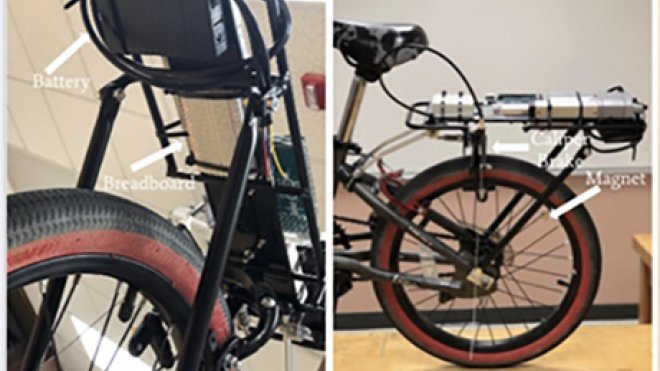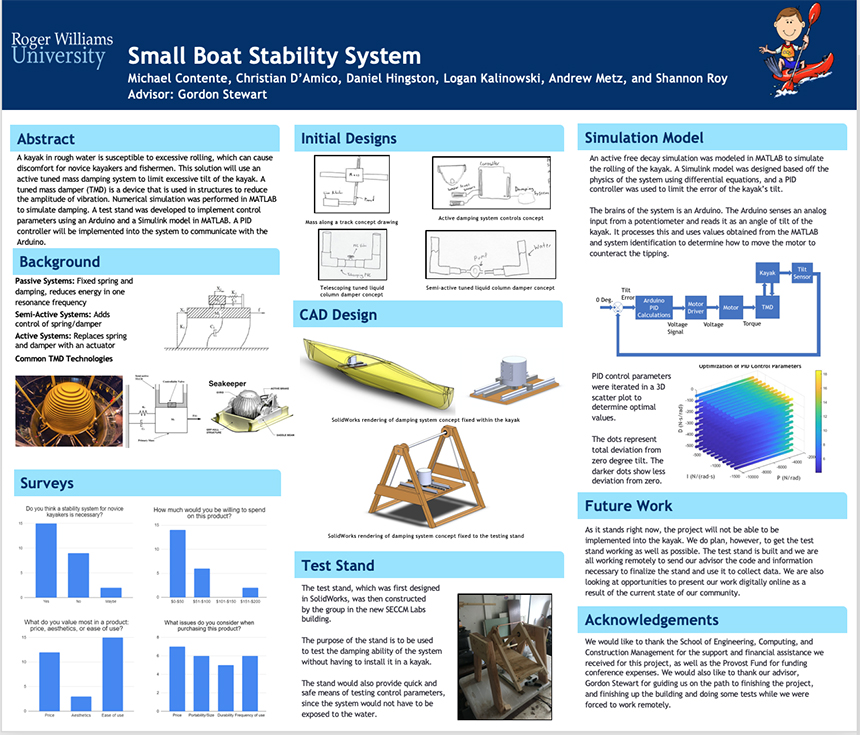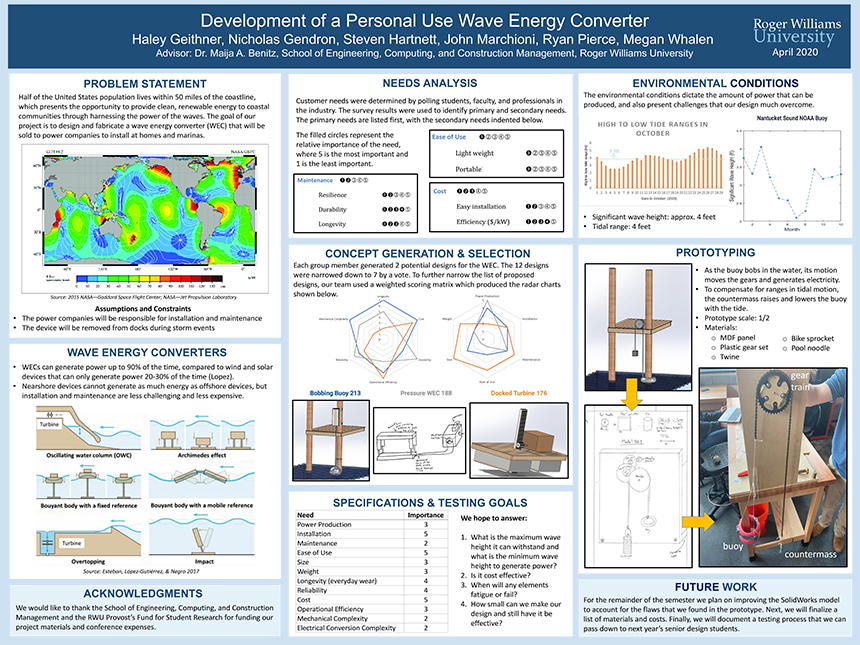‘A Lot of Silver Linings’ for Engineering Majors Taking Senior Design Projects Online
Senior engineering majors long planned to be fabricating projects in the new SECCM Labs building this spring. Continuing projects remotely, they've developed essential project-collaboration communication skills that working engineers use every day.
This story is part of a series highlighting RWU's innovative, student-centered approaches to education, with classes online for the remainder of the semester

Can a robot deliver pizza? Can a buoy characterize waves as they come ashore, or harness their energy? This year, RWU senior engineering majors worked to answer these questions – and more – through their Senior Design Projects. Though social distancing halted fabrication for many of their designs, students are seeing their projects through to the end, learning essential communication skills as they go.
The Senior Design Project is a fundamental element of senior year for RWU engineering majors. From August through May, senior engineering majors collaborate in teams, integrating math, science, computer science, and engineering principles into a comprehensive, client-based engineering design project. Student teams work with faculty advisors to design and fabricate solutions to open-ended problems and then present their projects at professional conferences and competitions.
This spring, conferences are cancelled and fabrication is put on hold for many projects, but students and faculty are still hard at work. With a few key changes, Senior Design Projects are providing opportunities for students to strengthen real-world communication skills in the distance learning environment.
Communicating a project: For a machinist
“There are actually a lot of silver linings,” said Adjunct Professor Gordon Stewart, who is mentoring a Senior Design team creating a stability device for a kayak or small boat. Stewart set up his team’s materials in his garage and is assembling them based on specific instructions from his students.
“Essentially, I am now the machinist and they are the engineers. When you get to a real-world job, you are usually not actually the one doing the building. You come up with a design on the computer and send it off to a machinist. Being able to come up with a design that is actually manufacturable is a big skill for engineers,” said Stewart.

Even in cases where fabrication is impossible, project mentors found ways to bring communication skills to the forefront of the Senior Design experience.
For the next team
Each year, one Senior Design team participates in the American Institute of Steel Constructions’ Student Steel Bridge Competition. This year, the team, mentored by Assistant Professor of Engineering Nicole Martino, was working on fabricating a 21-foot steel bridge that could hold 2,500 pounds. With the competition cancelled due to COVID-19, the team is now deepening their analysis to optimize the weight of the structure and preparing a document of best practices to pass on to next year’s team.
“Passing along a project can happen in the real world in your engineering career. You may pass a project to another team when you are midway through it. Can you document it thoroughly enough that someone can pick up this project, understand everything you’ve done, and know where to go forward? It helps students grow in a lot of very practical skills in communicating engineering knowledge,” said Maija Benitz, Assistant Professor of Engineering.
Olivia Ryan’s Senior Design team is now developing an in-depth proof of concept for their Smart Bike project, incorporating technology into a bicycle to help improve children’s bicycle safety. While they won’t be able to complete the fabrication of a remote-control braking system, among other features, the proof of concept gives them practice in a professional engineering skill.
“They wouldn’t normally ask us to do this, but since we aren’t able to fabricate it, we can go more in depth into proving it. If our project had been fabricated and worked, we could have shown a video, but now we have to communicate what we wanted to do. We are being more thorough and diligent,” said Ryan.

For outside evaluators
Without conferences for students to attend, engineering faculty are working together to replicate the experience of communicating project ideas to outside evaluators. Students recorded video explanations of the posters they would have shared at poster sessions, which were sent to the professional advisement board for their critique. Their final presentations will take place over Zoom, with question-and-answer sessions allowing students to defend their posters in real-time.
“A professional, outside audience will give feedback to the students. I wanted them to learn how to communicate with someone who doesn’t know everything about their project. The objectives are still being met, it will just all be online,” said Professor of Engineering Janet Baldwin.
For potential employers
Developing these professional skills prepares students for the demands of their future engineering careers.
“Students put their projects on their resumes. Some of the students say they have even gotten jobs because of their projects. Employers look at the projects and think, ‘Oh, that’s the kind of thing that we do,’” said Baldwin.
Senior Ashley Bosse secured her upcoming job with Fuss & O’Neill, a civil and environmental engineering consulting firm, with help from her Senior Design Project. Her team designed a solution to stabilize erosion on Sowams Road in Barrington, Rhode Island, giving her experience in environmental site assessment and permitting that she will use in her new position.
“The Senior Design Project itself gave me a lot to talk about in my interview. It gave me a sense of confidence when I walked in,” she said. “Fuss & O’Neill is starting a similar project in Barrington, so we were able to go back and forth about that. They were considering a lot of the ideas my team had discussed. It was cool to see that we were on the right track, that an engineering firm working in the same area would think our ideas were reasonable as a solution,” she said.
Bosse is grateful to her professors for giving her the support that helped her find success.
“I can’t say enough good things about the engineering department. All the professors are just so helpful. They have been putting in so much effort to deliver the same quality education remotely. Even they aren’t your advisor they give you an outside perspective on your senior design project. I feel like I’m in good hands,” she said.
Related story: How to Meet a Lab’s Hands-On Learning Goals? Engineering Professors are ’Working Hard to Make It Work’
Faculty, Students and Staff: Do you have a story of innovative distance learning at RWU? Email us at stories@rwu.edu